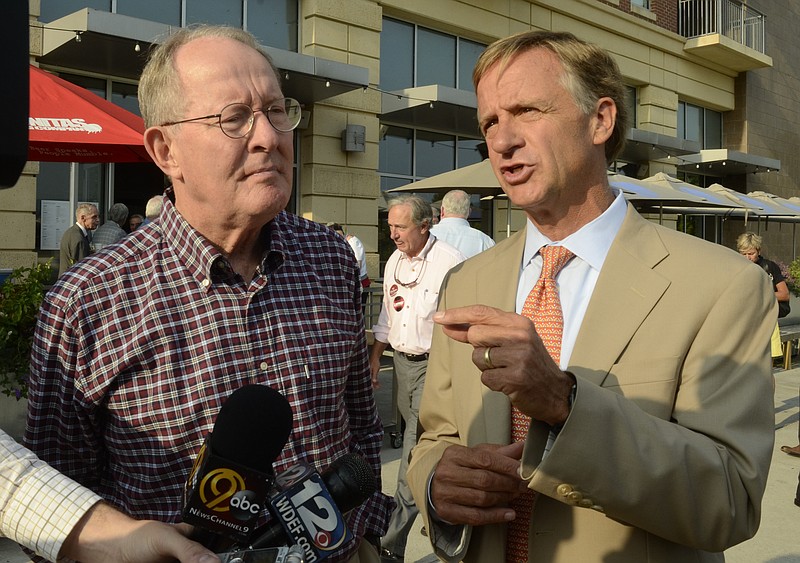What does it say about Washington, D.C., that much of what we've thought of as Tennessee's brainpower is leaving, and seemingly no one with the usual political credentials seems to want to run for the vacant seats?
Tennessee is a state of great statesmen: Howard Baker, the great conciliator, Fred Thompson, Bill Frist, Al Gore, Estes Kefauver and Al Gore Sr. They all had one thing in common: They were willing to work toward a solution and get things done. Sometimes we call this compromise or consensus. Sometimes we just call it common sense for the common good.
And for the past decade or so, we've continued to have plenty of firepower in the Senate with Chattanooga's former mayor and developer Bob Corker and Maryville's Lamar Alexander - a former Tennessee governor, former University of Tennessee president, former U.S. Secretary of Education and two-time presidential candidate.
But Corker opted not to run again in 2018 after realizing that norms of political agreements and disagreements and consensus building couldn't survive in the era of Trump chaos and ineptitude, leaving us with former U.S. Rep. Marsha Blackburn.
In December, Alexander, too, announced he would not seek re-election. And on Thursday, the next great Republican hope, former two-term Tennessee Gov. Bill Haslam, said he has decided not to seek Alexander's seat. That news followed Democrat and Chattanooga Mayor Andy Berke's decision recently not to put the title of senator in front of his name, either.
So far, few names are still in wide circulation. Democrat James Mackler, a Nashville attorney and Iraq war veteran, has long been running for his party's nomination. And Nashville trauma surgeon Manny Sethi has announced on the GOP side.
U.S. Rep. Mark Green, a Clarksville Republican, was mulling a bid, and there is talk former Economic and Community Development Commissioner (under Haslam) Bill Hagerty might step up. Hagerty was appointed by Trump as U.S. ambassador to Japan. Rep. Chuck Fleischmann is a possibility.
But normally, there would be a dozen names - most heavy hitters -in those declared and might-run descriptions.
But consider the new demands of the job in era of Trump chaos. Just ask Bob Corker, who in May told a couple of Chattanooga crowds that he'd not watched one minute of cable news shows since January - and didn't miss it.
Though Corker was a prominent Trump supporter in the 2016 presidential campaign, he and other Republicans appeared to see things slipping less than a year into Trump's win - especially in the president's handling of the deadly white-supremacist rally in Charlottesville.
Several presidential confidants told reporters they were beginning to understand that Trump paid more attention to what he heard on television than to what advisers told him, so a few were using TV interviews to get through to him. Perhaps that was the gentle nudge Corker was trying when, in front of cameras and microphones at the Chattanooga Rotary Club, he said, "The president has not yet been able to demonstrate the stability nor some of the competence that he needs to demonstrate in order to be successful."
Things went downhill from there, and in coming months Trump would refer to Corker as "liddle Bob," and Corker would refer to the White House as "adult day care" where "someone missed their shift this morning."
Of course, Corker wasn't - isn't - the only Republican senator to come under attack from Trump's presidential bully pulpit. Trump also undercut Arizona senators John McCain and Jeff Flake, and even Senate Majority Leader Mitch McConnell of Kentucky and Sen. Lindsey Graham of South Carolina.
McCain, though deceased, remains a recipient of Trump's disrespect. Flake, like Corker, opted not to seek re-election - the conventional wisdom being that a Trump-supported primary challenge would send Flake home in defeat. In that climate, McConnell and Graham folded their resistance tents and became Trump lapdogs - apparently believing that was the only way to survive in the new D.C. swamp cult compound.
Frankly, things aren't much different for Republicans in the Democratic-controlled House. That's why the lone Republican calling for Trump's impeachment, Rep. Justin Amash, libertarian from Michigan, recently withdrew from the Republican Party and declared himself an independent.
Amash blames bitter partisanship, but it's more than that.
It's the example of Trump - the normalization of words and actions made with contempt in order to provoke contempt - that makes the kind of civility and compromise of the Baker, Thompson and Gore days seem like a fairy tale dream.
It's also more than the normalization of "my-way-or-the-highway."
The House - this one and last one under Republican majority - passed hundreds of pieces of legislation that the Senate never picked up and even considered - even popular ones like election security and ensuring protections for patients with preexisting health conditions. Why? Lapdog Mitch McConnell holds the gate key.
It seems little wonder that Tennessee's Senate hopefuls aren't so hopeful.
